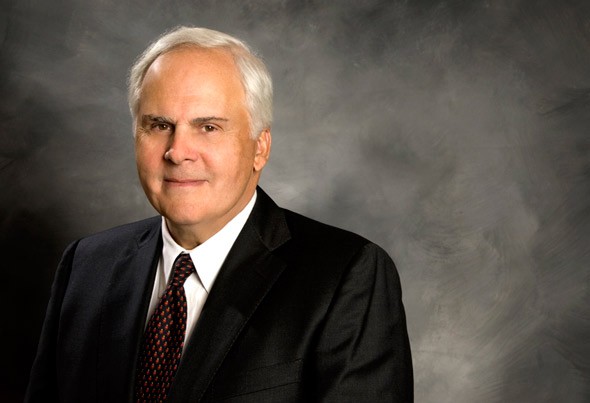“It’s been said many times that the only certainty in life is change. That’s been true in my life and the life of FedEx. No matter what’s happening in our industry now, it won’t be the same 10 years from now.”
So said FedEx founder Fred Smith in May in a speech to the Wings Club in New York City titled “Air Cargo: Back to the Future” that played off the 1985 movie with Michael J. Fox as time traveler Marty McFly. Someone thought enough of the speech to put it in a hardcover book distributed at the 2012 Investors and Lenders Meeting at the Hilton this week. Only 16 pages, including pictures and charts, it gives as concise a history of the forces that drove the growth of FedEx (and therefore Memphis indirectly) as you will find.
The Big Change (“a really big deal,” Smith said) coming up is the company’s plan to achieve $1.7 billion in annual profit improvement by the end of fiscal year 2016. The shareholders’ gain will, to some extent, be Memphis’s loss. A salaried FedEx employee who takes a voluntary buyout is probably a Shelby County resident with a six-figure family income, a house, maybe kids in private schools, possibly a Grizzlies season-ticket buyer, a leader in his or her community, a donor to charities, and someone with the mobility to move somewhere else. Multiply by several hundred and it’s a big ripple effect. More jobs at the SuperHub won’t offset that.
How big? Imagine if the news had been of a different nature. Substitute thousands of “hires” for “voluntary buyouts” and “expansion” for “cost reductions”. Keep the focus on Tennessee, and leave in the uncertainty about the timing and extent of the change if you like. Now imagine the reaction of local politicians and a chamber of commerce that was ready to break out the sombreros and the mariachi band for an expansion of air service to Mexico that never happened. Cartwheels, anyone?
If Memphis was a stock its price would be down today. How much? I’d say about five percent, which was roughly the increase in the price of FedEx stock on Wednesday after the opening salvos of the upbeat two-day conference for investors and lenders. Stock price, of course, reflects current and future earnings.
This week showed Fred Smith as salesman and head coach as well as CEO. He gave the keynote speech Tuesday night and moderated Wednesday’s closing panel discussion and Q & A with analysts. It was the founder of a great company giving his vision and putting his heart into it, like Steve Jobs at Apple or Bill Gates at Microsoft. There were Power Points for sure, but there were also flashes of humor, as when he said “Raymond who” to Raymond James analyst Art Hatfield, formerly of Morgan Keegan. There was testiness, as when, with eyes blazing like coals above a frown, he chided a questioner about his characterization of “decline, decline, decline” in one segment of FedEx’s business. But mostly there was confidence and an air of command on display before a group of analysts, many of whom looked like they weren’t born when Federal Express was founded in 1970.
“I don’t have any plans to retire at the moment, and I certainly want to see this plan through,” Smith said in response to a question Wednesday.
The stock market is about telling stories to analysts and lenders who can in turn tell them to brokers, investors and other lenders. FedEx top brass gave them a compelling story at a time when the domestic economy and its own stock is in a funk, and was rewarded with an immediate boost in its stock price and a spike in those fanciful but irresistible long-range “price targets” up to $150. FedEx breached $100 a share in 2006 and 2007 and has not crossed that milestone since. In 2009 you could have had it for $42. If you bought then, you’ve doubled your money, but if you’re a long time buy-and-hold investor the stock delivered modest returns.
For context, here are a few excerpts from Smith’s “Back to the Future” speech:
“The 747 air freighter gave air cargo a starring role in the air transportation system, instead of its being an after-thought in the underbellies of passenger planes. Now, finally, you had the plane to carry computers, electronics, and other high value perishables such as flowers across vast distances.”
“As the 747 began to dominate long-haul services, an upstart network called Federal Express began flying from Memphis in spring 1973 with less than 200 packages rattling around in 14 small Dassault Falcons going to 25 cities on its first day.”
“We understood at FedEx that information about the package is as important as the package itself, so we also originated the first tracking system.”
“There’s a cloud hanging over today’s industrial horizon — the high price of oil. I’ll never forget the effect of 1973’s embargo on a fledgling FedEx. We almost went under before we’d barely begun . . . In 1999 oil was $16 a barrel. In 2008 it was $147 a barrel — a 900% increase.”
“Let’s compare a 747 and a large container ship. For the ship it takes one ton of fuel to move 330 tons of cargo. For the plane, it takes about 330 tons of fuel to move the same amount of cargo . . . All those big ships are nibbling away at the air cargo business, and those bites will become bigger when the Panama Canal expansion is completed in 2014.”
“Bigger commodity consignments are increasingly moving by sea, and dedicated express networks and underbellies are capturing more urgent, lighter shipments. So in many ways the future of air cargo is akin to the early days of the industry.”
“The takeaway from this evolution of the air cargo industry is that the air express sector will continue to grown long-term as the integration of the world’s economies generate more small shipments moving directly from point of production to the end user.”


